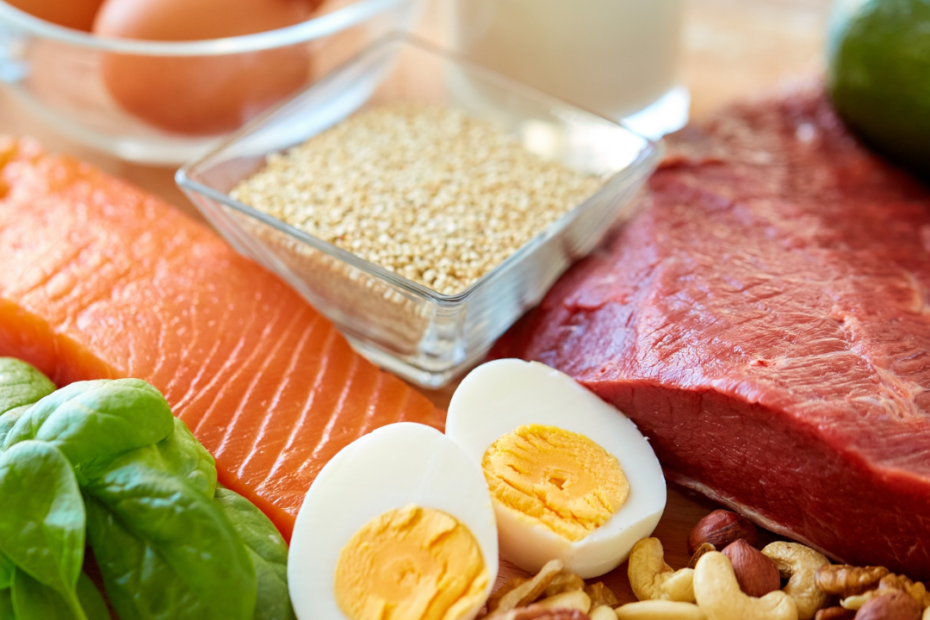Proteins are complex molecules that make up about 20% of the human body and are critical to its structure, function, maintenance, and regulation. Proteins are made up of chains of amino acids, called the building blocks of protein, which are categorized as either essential or nonessential. There are twenty amino acids in total that our bodies need to function properly, some of which are considered nonessential because we can produce them on our own. Nine of the twenty amino acids, however, are essential amino acids, meaning they cannot be produced by the body and must therefore be obtained through one’s diet.
Protein, one of the major macronutrients required in our diets, is commonly found in both animal and plant products. Animal sources of protein, such as meat, fish, poultry, eggs, and dairy, are known as complete proteins because they contain all nine of the essential amino acids our bodies need in adequate quantities. Some plant products, such as soybeans and quinoa, are also complete proteins; however, most plant proteins are generally considered incomplete proteins as they do not contain all the essential amino acids.
The recommended dietary intake of protein to prevent deficiency in a sedentary adult is 0.35 grams of protein per pound of body weight (or 0.8 g/kg) which would amount to about 60 grams per day for a 165-pound sedentary person. This recommendation, of course, varies depending on activity level, age, muscle mass and overall health, but is good general rule of thumb to use as a guide. For reference, a 3oz serving of chicken provides about 23g of protein.
But how about for those of us who follow complete or mainly plant-based diets? Is it possible to obtain enough protein, and in the right amounts that our bodies need? The short answer is: Yes! And the good news is, those who do not eat animal protein can stop worrying about protein-combining to make sure they’re getting the right combination of essential amino acids at every meal. Instead, vegans and vegetarians should focus on consuming a variety of plant-based protein sources throughout their days and weeks and making sure they are choosing plant sources that are high in protein!
We’ve pulled together some of our favorite plant-based protein sources below. Upgrade your plant proteins by incorporating some of these into your diet!
- Quinoa – A complete protein! Provides about 8g of protein per 1 cooked cup
- Soy – A complete protein! Can be consumed in the form of soybeans (29 g/cup), tofu (20 g/cup), tempeh (31 g/cup) or edamame (17 g/cup) – all great sources of complete protein!
- Seitan – Made from gluten (the main protein in wheat) and provides 25g of protein per 3.5 oz serving
- Lentils – Full of fiber, low in fat, and provide about 18g protein per cooked cup
- Beans (kidney, black, pinto, garbanzo) – A great source of fiber and phytonutrients, providing about 15g of protein per cooked cup
- Nutritional Yeast – Delicious sprinkled on popcorn, potatoes and veggies, or mixed into a pasta, nutrition yeast provides about 8g of protein per 1oz serving
- Hemp Seeds – The perfect addition to a salad, yogurt or just about anything! Provides 9g of protein per 1.5oz serving
- Oats – One cup of oats at your next breakfast meal will provide about 11g or protein!
- Green Peas – These little plants pack a big punch, providing about 8g of protein per one cooked cup
- Chia Seeds – Mix into baked goods, granola, oatmeal, or yogurt or make your own chia seed pudding! Chia seeds provide about 4.7g of protein per every ounce
Content submitted by Jessica Roy MS, RD, LDN Registered Dietitian & Nutrition Counselor, and Caroline Meyer, Nutrition Intern
